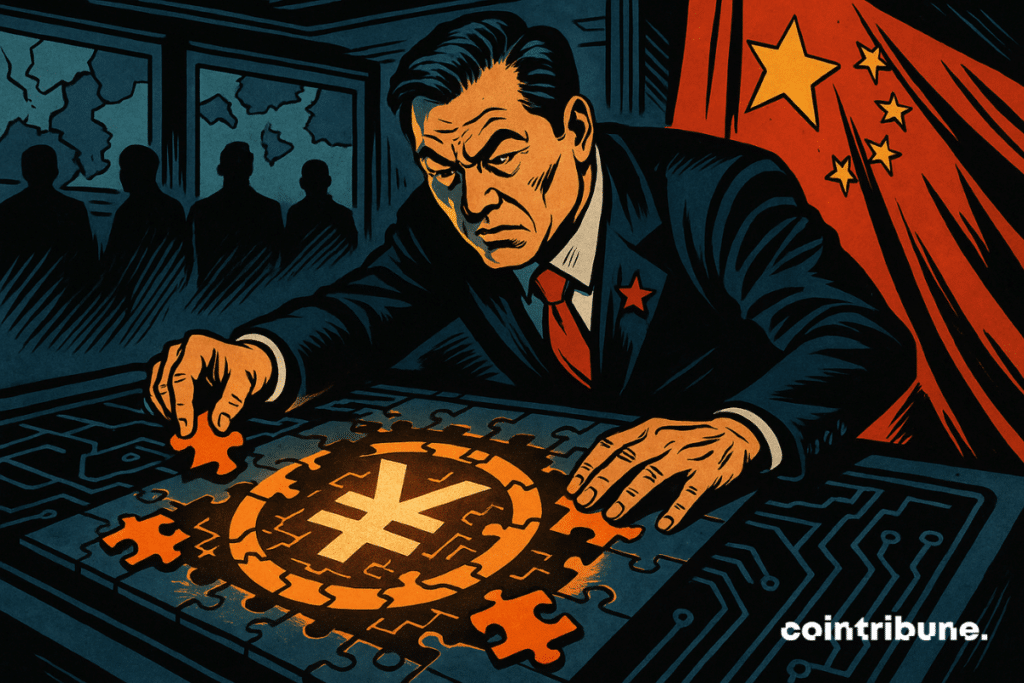China's Quiet March Toward Stablecoin Adoption
While the United States bets on an open regulation of stablecoins with the GENIUS Act, China chooses a more discreet path. In Shanghai, a strategic meeting reveals a willingness to experiment, without losing control.

In brief
- Shanghai is holding its first public study session on stablecoins despite the national ban on cryptocurrencies.
- The closed-door meeting explores the use of stablecoins for cross-border trade and supply chain management.
- Experts describe the approach as a “multi-layered experiment” rather than a move toward crypto liberalization. Demander à ChatGPT
China explores stablecoins without a clear line
The Shanghai State-owned Assets Supervision and Administration Commission (SASAC) held an unprecedented strategic meeting last week, chaired by He Qing.
The goal: to explore how public enterprises could use blockchain technology to improve their operations, particularly in cross-border trade.
This is the first time stablecoins are addressed so directly within an official regulatory framework in China.
He Qing emphasized the importance of better understanding emerging technologies and deepening research on digital currencies. A strong message, especially in a country where cryptos remain officially banned.
This contrast reveals a more subtle strategy than it appears: Chinese authorities seem ready to experiment with certain innovations, as long as they remain under state control.
The discussions notably focused on asset digitization and supply chain optimization through blockchain. A dynamic that contrasts with the warning issued a few days earlier by the city of Shenzhen regarding stablecoin scams.
For Sam MacPherson, CEO of Phoenix Labs, this is easily explained:
Stablecoins are considered sovereign financial instruments and not investment assets.
Controlled experimentation with global implications
The governor of the People’s Bank of China, Pan Gongsheng, broke the official silence on stablecoins at the Lujiazui Forum 2025.
For the first time, the Chinese central bank publicly addresses these digital assets. Pan recognizes that blockchain is transforming international payments and speeding up money transfers between countries.
“These innovations accelerate the development of central bank digital currencies and stablecoins, and reshape traditional payment and settlement systems“, the governor said.
This statement reveals that Beijing understands the major geopolitical stake of stablecoins for global monetary sovereignty.
China tests different approaches depending on its regions. Hong Kong maintains an “open” stance on digital assets. Shenzhen remains more cautious under the direct control of the central government. Shanghai cautiously explores the possibilities.
MacPherson explains that this apparent contradiction actually hides a “coordinated experimentation”.
This Chinese strategy fits into a favorable Asian context. South Korea, Singapore, and Hong Kong are actively developing their stablecoin infrastructures.
Beijing is also observing American initiatives, notably the GENIUS Act bill which could legalize stablecoins in the United States.
China advances with calculated small steps. It neither wants to completely ban nor adopt without control. The goal: to keep a grip on monetary innovation. Stablecoins thus become the guinea pigs of a discreet but decisive financial transformation for the future of the digital yuan.
Maximize your Cointribune experience with our "Read to Earn" program! For every article you read, earn points and access exclusive rewards. Sign up now and start earning benefits.
Passionné par le Bitcoin, j'aime explorer les méandres de la blockchain et des cryptos et je partage mes découvertes avec la communauté. Mon rêve est de vivre dans un monde où la vie privée et la liberté financière sont garanties pour tous, et je crois fermement que Bitcoin est l'outil qui peut rendre cela possible.
The views, thoughts, and opinions expressed in this article belong solely to the author, and should not be taken as investment advice. Do your own research before taking any investment decisions.